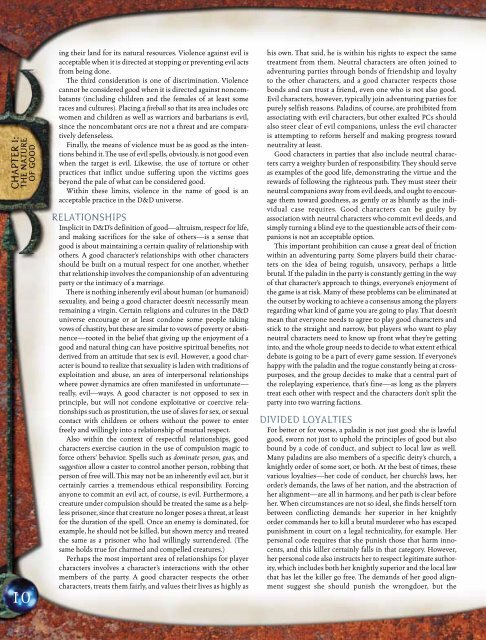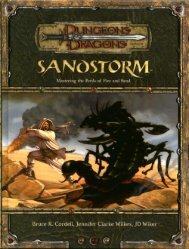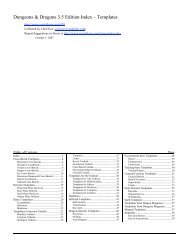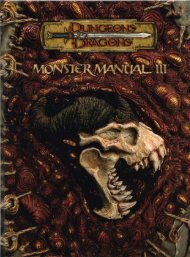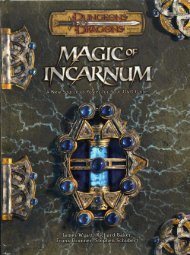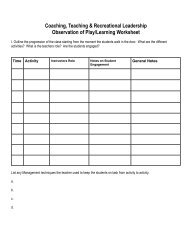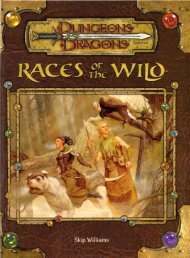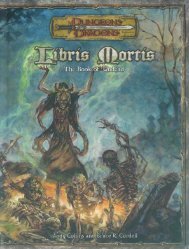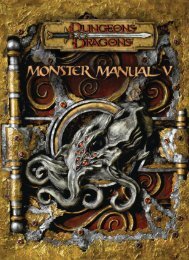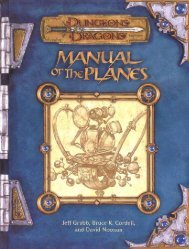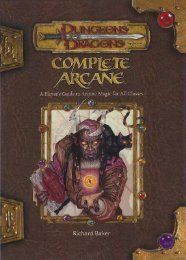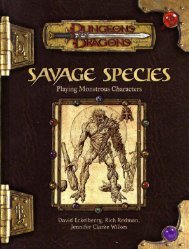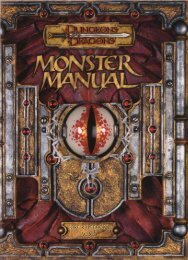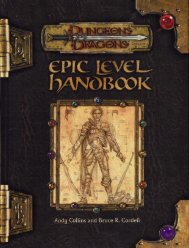CHAPTER 1:THE NATUREOF GOOD10ing their land for its natural resources. Violence against evil isacceptable when it is directed at stopping or preventing evil actsfrom being done.The third consideration is one <strong>of</strong> discrimination. Violencecannot be considered good when it is directed against noncombatants(including children and the females <strong>of</strong> at least someraces and cultures). Placing a fireball so that its area includes orcwomen and children as well as warriors and barbarians is evil,since the noncombatant orcs are not a threat and are comparativelydefenseless.Finally, the means <strong>of</strong> violence must be as good as the intentionsbehind it. The use <strong>of</strong> evil spells, obviously, is not good evenwhen the target is evil. Likewise, the use <strong>of</strong> torture or otherpractices that inflict undue suffering upon the victims goesbeyond the pale <strong>of</strong> what can be considered good.Within these limits, violence in the name <strong>of</strong> good is anacceptable practice in the D&D universe.RELATIONSHIPSImplicit in D&D’s definition <strong>of</strong> good—altruism, respect for life,and making sacrifices for the sake <strong>of</strong> others—is a sense thatgood is about maintaining a certain quality <strong>of</strong> relationship withothers. A good character’s relationships with other charactersshould be built on a mutual respect for one another, whetherthat relationship involves the companionship <strong>of</strong> an adventuringparty or the intimacy <strong>of</strong> a marriage.There is nothing inherently evil about human (or humanoid)sexuality, and being a good character doesn’t necessarily meanremaining a virgin. Certain religions and cultures in the D&Duniverse encourage or at least condone some people takingvows <strong>of</strong> chastity, but these are similar to vows <strong>of</strong> poverty or abstinence—rootedin the belief that giving up the enjoyment <strong>of</strong> agood and natural thing can have positive spiritual benefits, notderived from an attitude that sex is evil. However, a good characteris bound to realize that sexuality is laden with traditions <strong>of</strong>exploitation and abuse, an area <strong>of</strong> interpersonal relationshipswhere power dynamics are <strong>of</strong>ten manifested in unfortunate—really, evil—ways. A good character is not opposed to sex inprinciple, but will not condone exploitative or coercive relationshipssuch as prostitution, the use <strong>of</strong> slaves for sex, or sexualcontact with children or others without the power to enterfreely and willingly into a relationship <strong>of</strong> mutual respect.Also within the context <strong>of</strong> respectful relationships, goodcharacters exercise caution in the use <strong>of</strong> compulsion magic t<strong>of</strong>orce others’ behavior. Spells such as dominate person, geas, andsuggestion allow a caster to control another person, robbing thatperson <strong>of</strong> free will. This may not be an inherently evil act, but itcertainly carries a tremendous ethical responsibility. Forcinganyone to commit an evil act, <strong>of</strong> course, is evil. Furthermore, acreature under compulsion should be treated the same as a helplessprisoner, since that creature no longer poses a threat, at leastfor the duration <strong>of</strong> the spell. Once an enemy is dominated, forexample, he should not be killed, but shown mercy and treatedthe same as a prisoner who had willingly surrendered. (Thesame holds true for charmed and compelled creatures.)Perhaps the most important area <strong>of</strong> relationships for playercharacters involves a character’s interactions with the othermembers <strong>of</strong> the party. A good character respects the othercharacters, treats them fairly, and values their lives as highly ashis own. That said, he is within his rights to expect the sametreatment from them. Neutral characters are <strong>of</strong>ten joined toadventuring parties through bonds <strong>of</strong> friendship and loyaltyto the other characters, and a good character respects thosebonds and can trust a friend, even one who is not also good.Evil characters, however, typically join adventuring parties forpurely selfish reasons. Paladins, <strong>of</strong> course, are prohibited fromassociating with evil characters, but other exalted PCs shouldalso steer clear <strong>of</strong> evil companions, unless the evil characteris attempting to reform herself and making progress towardneutrality at least.Good characters in parties that also include neutral characterscarry a weighty burden <strong>of</strong> responsibility. They should serveas examples <strong>of</strong> the good life, demonstrating the virtue and therewards <strong>of</strong> following the righteous path. They must steer theirneutral companions away from evil deeds, and ought to encouragethem toward goodness, as gently or as bluntly as the individualcase requires. Good characters can be guilty byassociation with neutral characters who commit evil deeds, andsimply turning a blind eye to the questionable acts <strong>of</strong> their companionsis not an acceptable option.This important prohibition can cause a great deal <strong>of</strong> frictionwithin an adventuring party. Some players build their characterson the idea <strong>of</strong> being roguish, unsavory, perhaps a littlebrutal. If the paladin in the party is constantly getting in the way<strong>of</strong> that character’s approach to things, everyone’s enjoyment <strong>of</strong>the game is at risk. Many <strong>of</strong> these problems can be eliminated atthe outset by working to achieve a consensus among the playersregarding what kind <strong>of</strong> game you are going to play. That doesn’tmean that everyone needs to agree to play good characters andstick to the straight and narrow, but players who want to playneutral characters need to know up front what they’re gettinginto, and the whole group needs to decide to what extent ethicaldebate is going to be a part <strong>of</strong> every game session. If everyone’shappy with the paladin and the rogue constantly being at crosspurposes,and the group decides to make that a central part <strong>of</strong>the roleplaying experience, that’s fine—as long as the playerstreat each other with respect and the characters don’t split theparty into two warring factions.DIVIDED LOYALTIESFor better or for worse, a paladin is not just good: she is lawfulgood, sworn not just to uphold the principles <strong>of</strong> good but alsobound by a code <strong>of</strong> conduct, and subject to local law as well.Many paladins are also members <strong>of</strong> a specific deity’s church, aknightly order <strong>of</strong> some sort, or both. At the best <strong>of</strong> times, thesevarious loyalties—her code <strong>of</strong> conduct, her church’s laws, herorder’s demands, the laws <strong>of</strong> her nation, and the abstraction <strong>of</strong>her alignment—are all in harmony, and her path is clear beforeher. When circumstances are not so ideal, she finds herself tornbetween conflicting demands: her superior in her knightlyorder commands her to kill a brutal murderer who has escapedpunishment in court on a legal technicality, for example. Herpersonal code requires that she punish those that harm innocents,and this killer certainly falls in that category. However,her personal code also instructs her to respect legitimate authority,which includes both her knightly superior and the local lawthat has let the killer go free. The demands <strong>of</strong> her good alignmentsuggest she should punish the wrongdoer, but the
demands <strong>of</strong> her lawful alignment insist that she obey the judgment<strong>of</strong> the court. It is entirely possible that either her superioror the magistrate in the case is corrupt or even possessed.Whom does she obey? How does she sort out the conflictingdemands <strong>of</strong> her loyalties?Paladins are by no means alone in this situation. Any characterwho tries consistently to do good eventually finds himselfin a situation where different loyalties are in conflict. Chaoticgood characters might care far less about a potentially corruptor at least ineffectual court system, but they might have otherpersonal standards or obligations that cause conflict in similaror different situations. In the end, however, many such conflictsboil down to a question <strong>of</strong> priorities, and for a characterwho aspires to exalted deeds, good is the highest priority. In theexample above, the murderer must at least be captured, if notkilled, before he can kill again. If she has reason to suspect corruption,either in the court or in her own order, the paladinmust attempt to uncover it, though it might mean being castout <strong>of</strong> her order, punished under local law, or both. Her paladinhoodand her exalted status remain intact, since she acted inthe cause <strong>of</strong> good even when that required questioning thelegitimacy <strong>of</strong> authority. Magistrates or knightly superiors whoserve the cause <strong>of</strong> evil while posing as agents <strong>of</strong> good are notlegitimate authority, and the paladin is right for exposing theircorruption.What does a good character do when he is opposed by good?Two good nations might go to war, two good adventuring partiesmight be working toward opposite goals, or two good charactersmight become bitter enemies. As discussed underViolence, above, violence against good creatures is not good.When conflict arises, as it certainly will at times, good charactersmust use every diplomatic means available to avoid the outbreak<strong>of</strong> violence, whether between nations, smaller groups, orindividuals. In the D&D universe, if one side’s goals are actuallyevil, a relatively simple commune spell can make that abundantlyclear. Diplomacy might not always work, but the outbreak <strong>of</strong>violence is not just a failure <strong>of</strong> diplomacy, it is a failure <strong>of</strong> goodand a victory for evil.CRIME AND PUNISHMENTWhen dealing with evildoers who are citizens <strong>of</strong> the realmspecifically, or members <strong>of</strong> the civilized humanoid races (dwarf,elf, gnome, half-elf, half-orc, halfling, human) in general, it is<strong>of</strong>ten preferable to bring evildoers to justice in the form <strong>of</strong> legitimatelegal authority rather than meting out that justice oneself.When fighting through a dungeon, characters needn’t switch tosubdual tactics when they suddenly encounter evil dwarf minions.But if those minions surrender, it is best to take the prisonersback to town to stand trial for their crimes. When theadventure takes place in a city and the opponents are citizens <strong>of</strong>the city (rather than evil monsters from the sewers or deeperunderground), subduing opponents and turning them over tothe city watch is preferable to killing them and possibly beingforced to stand trial for murder.The principles <strong>of</strong> good make certain demands about howcriminals are treated. The death penalty for serious crimes iscommonly practiced and widely accepted and does not qualifyas evil, even if many good characters, firm in their belief thatredemption is always possible, would rather see even the vilestcriminals <strong>of</strong>fered the opportunity to find their way to righteousnessduring their imprisonment. Torturing prisoners,either to extract information or simply as a means <strong>of</strong> punishment,is unequivocally evil, however.This leads good characters (especially lawful good characters)into a dilemma: Is it wrong to turn a prisoner over to legitimateauthorities knowing that the prisoner will be tortured andabused in captivity? Fortunately, the answer is straightforward,if sometimes difficult to implement. Yes, delivering a personover to be tortured, even if the person is thoroughly evil and thetorturers are a legitimate authority, is evil. How to avoid beingput in that position is a more difficult question, and one thatdepends greatly on the circumstances.BEING AHEAD OF YOUR TIMEHeroic characters <strong>of</strong>ten end up at odds with their culture andsociety. The standards expected <strong>of</strong> good characters in D&D,especially those who lay claim to exalted status, bear much moresimilarity to modern sensibilities about justice, equality, andrespect for life than to the actual medieval world that D&D isloosely based on, and that is quite intentional. It is certainly possiblethat your campaign world might be a more enlightenedplace than medieval Europe—a place where men and womenare considered equal, slavery is not practiced in any form, tortureand capital punishment are shunned, and the varioushuman and humanoid races live together in harmony. In such acase, an exalted character can live in relative peace with her culture,and focus her attention on slaying evil creatures in ruinsand dungeons or rival, evil nations.On the other hand, your campaign world might more closelyreflect the realities <strong>of</strong> life in Earth’s Dark or Middle Ages. Perhapswomen are not viewed as men’s equals or even sentientbeings in their own right, slavery is widespread, testimony fromserfs is only acceptable if extracted through torture, andhumans <strong>of</strong> a certain skin tone (let alone nonhumans) areviewed as demonic creatures. It is vitally important to rememberone thing: these factors don’t change anything else said inthis chapter (or in the <strong>Book</strong> <strong>of</strong> Vile Darkness) about what constitutesa good or evil deed. Even if slavery, torture, or discriminationare condoned by society, they remain evil. That simplymeans that an exalted character has an even harder road t<strong>of</strong>ollow. Not only must she worry about external evils like conjureddemons and rampaging orc hordes, she must also contendwith the evil within her own society.In all likelihood, most human (and halfling) societies fallsomewhere between the two extremes described above. Ingame terms, humans tend to be neutral, neither good nor evil.Human societies might tolerate a variety <strong>of</strong> evil practices, evenif some humans find them distasteful. In such a circumstance,an exalted character is still at odds with the norms <strong>of</strong> her societyand may occasionally find herself in conflict with it, but she candevote her time and attention to dealing with evil acts, eitherinside or outside her society, rather than trying to reform anentire nation or culture.In situations where a society’s practices put good characters atodds with it, a good character’s alignment is the strongest indicator<strong>of</strong> how she will deal with that conflict.CHAPTER 1:THE NATUREOF GOOD11
- Page 4 and 5: INTRODUCTION4Illus. by S. BelladinI
- Page 6 and 7: CHAPTER 1:THE NATUREOF GOOD6others
- Page 8 and 9: CHAPTER 1:THE NATUREOF GOODtrations
- Page 12 and 13: CHAPTER 1:THE NATUREOF GOOD12Illus.
- Page 14 and 15: CHAPTER 1:THE NATUREOF GOOD14Illus.
- Page 16 and 17: CHAPTER 1:THE NATUREOF GOOD16Blessi
- Page 18 and 19: CHAPTER 1:THE NATUREOF GOOD18Illus.
- Page 20 and 21: CHAPTER 1:THE NATUREOF GOOD20forces
- Page 22 and 23: CHAPTER 1:THE NATUREOF GOOD22financ
- Page 24 and 25: CHAPTER 2:VARIANTRULES24Illus. by J
- Page 26 and 27: CHAPTER 2:VARIANTRULES26PHIERANPhie
- Page 28 and 29: CHAPTER 2:VARIANTRULES28Of course,
- Page 30 and 31: CHAPTER 2:VARIANTRULES30Illus. by J
- Page 32 and 33: CHAPTER 2:VARIANTRULES32character m
- Page 34 and 35: CHAPTER 3:EXALTEDEQUIPMENTcreature
- Page 36 and 37: CHAPTER 3:EXALTEDEQUIPMENTIllus. by
- Page 38 and 39: CHAPTER 3:EXALTEDEQUIPMENTIllus. by
- Page 40 and 41: CHAPTER 4:FEATS40Table 4-1: FeatsGe
- Page 42 and 43: CHAPTER 4:FEATS42CELESTIAL MOUNT [E
- Page 44 and 45: CHAPTER 4:FEATS44Prerequisites: Cha
- Page 46 and 47: CHAPTER 4:FEATS46SANCTIFY KI STRIKE
- Page 48 and 49: CHAPTER 4:FEATS48VOW OF OBEDIENCE [
- Page 50 and 51: CHAPTER 5:PRESTIGECLASSES50Table 5-
- Page 52 and 53: CHAPTER 5:PRESTIGECLASSES52CLASS FE
- Page 54 and 55: CHAPTER 5:PRESTIGECLASSES54Feats: M
- Page 56 and 57: CHAPTER 5:PRESTIGECLASSES56saving t
- Page 58 and 59: CHAPTER 5:PRESTIGECLASSESIllus. by
- Page 60 and 61:
CHAPTER 5:PRESTIGECLASSES60Table 5-
- Page 62 and 63:
Table 5-9: The Exalted ArcanistBase
- Page 64 and 65:
CHAPTER 5:PRESTIGECLASSES64Illus. b
- Page 66 and 67:
CHAPTER 5:PRESTIGECLASSES66ness, fi
- Page 68 and 69:
CHAPTER 5:PRESTIGECLASSESIllus. by
- Page 70 and 71:
CHAPTER 5:PRESTIGECLASSES70Table 5-
- Page 72 and 73:
pqqqqrsSKYLORD’S MOUNTSA skylord
- Page 74 and 75:
CHAPTER 5:PRESTIGECLASSES74progress
- Page 76 and 77:
CHAPTER 5:PRESTIGECLASSES76increase
- Page 78 and 79:
CHAPTER 5:PRESTIGECLASSES78Table 5-
- Page 80 and 81:
CHAPTER 5:PRESTIGECLASSES80Illus. b
- Page 82 and 83:
CHAPTER 5:PRESTIGECLASSES82WONDERWO
- Page 84 and 85:
CHAPTER 6:MAGIC84creating the item.
- Page 86 and 87:
CHAPTER 6:MAGIC86Shield of the Arch
- Page 88 and 89:
CHAPTER 6:MAGIC888 Last Judgment: E
- Page 90 and 91:
CHAPTER 6:MAGICdamage equal to that
- Page 92 and 93:
CHAPTER 6:MAGIC92Bastion of GoodAbj
- Page 94 and 95:
CHAPTER 6:MAGICCelestial BloodAbjur
- Page 96 and 97:
CHAPTER 6:MAGIC96four bariaur range
- Page 98 and 99:
CHAPTER 6:MAGIC98ElationEnchantment
- Page 100 and 101:
CHAPTER 6:MAGIC100that deal them hi
- Page 102 and 103:
CHAPTER 6:MAGIC102Effect: RayDurati
- Page 104 and 105:
CHAPTER 6:MAGIC10420 feet high and
- Page 106 and 107:
CHAPTER 6:MAGIC106affected as thoug
- Page 108 and 109:
CHAPTER 6:MAGICCasting Time: 1 hour
- Page 110 and 111:
CHAPTER 6:MAGIC110Telepathy TapDivi
- Page 112 and 113:
CHAPTER 6:MAGICMaterial Components:
- Page 114 and 115:
CHAPTER 6:MAGICIllus. by B. Chumley
- Page 116 and 117:
CHAPTER 6:MAGIC116WONDROUS MAGIC IT
- Page 118 and 119:
CHAPTER 6:MAGIC118Special: Seryl is
- Page 120 and 121:
CHAPTER 6:MAGIC120perhaps a guardin
- Page 122 and 123:
CHAPTER 7:CELESTIALPARAGONSTable 7-
- Page 124 and 125:
CHAPTER 7:CELESTIALPARAGONS124Celes
- Page 126 and 127:
CHAPTER 7:CELESTIALPARAGONS126This
- Page 128 and 129:
CHAPTER 7:CELESTIALPARAGONS128tyran
- Page 130 and 131:
CHAPTER 7:CELESTIALPARAGONS130ago a
- Page 132 and 133:
CHAPTER 7:CELESTIALPARAGONS132Drusu
- Page 134 and 135:
CHAPTER 7:CELESTIALPARAGONS1341 Dom
- Page 136 and 137:
CHAPTER 7:CELESTIALPARAGONS13625 ag
- Page 138 and 139:
CHAPTER 7:CELESTIALPARAGONS138magic
- Page 140 and 141:
CHAPTER 7:CELESTIALPARAGONS140Wild
- Page 142 and 143:
CHAPTER 7:CELESTIALPARAGONSIllus. b
- Page 144 and 145:
CHAPTER 7:CELESTIALPARAGONS144VHARA
- Page 146 and 147:
CHAPTER 7:CELESTIALPARAGONSIllus. b
- Page 148 and 149:
CHAPTER 7:CELESTIALPARAGONSIllus. b
- Page 150 and 151:
CHAPTER 7:CELESTIALPARAGONS150THE C
- Page 152 and 153:
CHAPTER 7:CELESTIALPARAGONSIllus. b
- Page 154 and 155:
CHAPTER 7:CELESTIALPARAGONS154attac
- Page 156 and 157:
CHAPTER 7:CELESTIALPARAGONS156Gwynh
- Page 158 and 159:
CHAPTER 8:MONSTERSIllus. by S. Bell
- Page 160 and 161:
CHAPTER 8:MONSTERS160Abilities: Str
- Page 162 and 163:
CHAPTER 8:MONSTERS162(DC 18), mark
- Page 164 and 165:
CHAPTER 8:MONSTERSIllus. by M. Nels
- Page 166 and 167:
Bariaurs revere Ehlonna, deity of t
- Page 168 and 169:
CHAPTER 8:MONSTERS168Environment: U
- Page 170 and 171:
CHAPTER 8:MONSTERS170The firre (pro
- Page 172 and 173:
CHAPTER 8:MONSTERS172Survival +7 (+
- Page 174 and 175:
CHAPTER 8:MONSTERSIllus. by G. Kubi
- Page 176 and 177:
CHAPTER 8:MONSTERSWinged Elephant F
- Page 178 and 179:
CHAPTER 8:MONSTERSLeskylorThree-Hea
- Page 180 and 181:
CHAPTER 8:MONSTERS180the dismissal
- Page 182 and 183:
CHAPTER 8:MONSTERSRhek Rhek Chaosgr
- Page 184 and 185:
CHAPTER 8:MONSTERS184or magic, with
- Page 186 and 187:
CHAPTER 8:MONSTERS186HDDamage Reduc
- Page 188 and 189:
CHAPTER 8:MONSTERS188SWARM, DIVINE
- Page 190 and 191:
CHAPTER 8:MONSTERS190a life taken b
- Page 193 and 194:
Design:Editing:Typesetting:Design M
- Page 195 and 196:
Outsider Traits: Chuud cannot be ra
- Page 197:
troublesome would be eaten first. H


